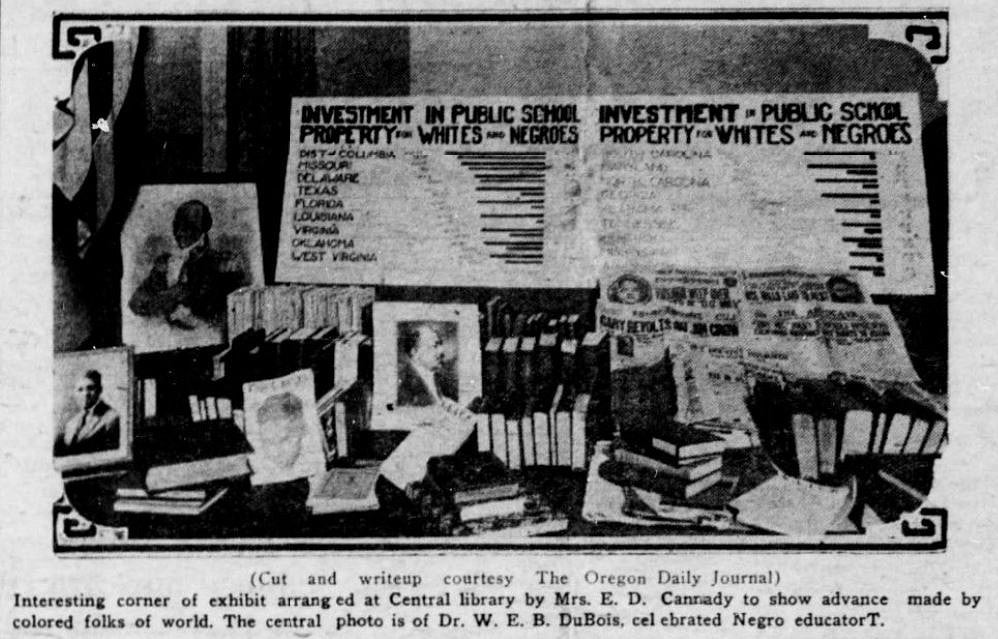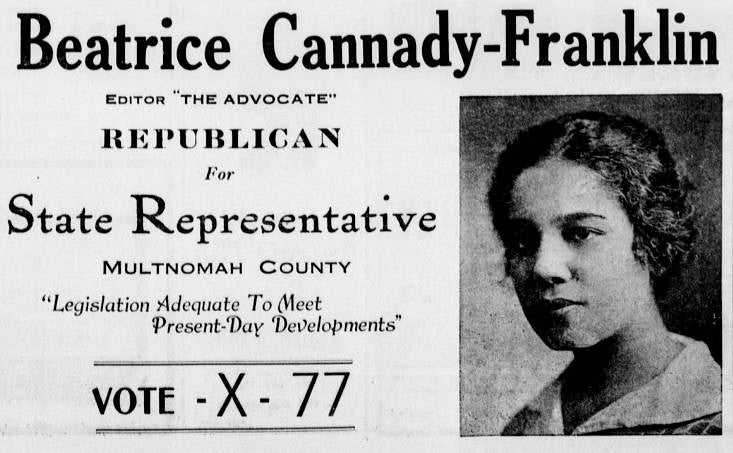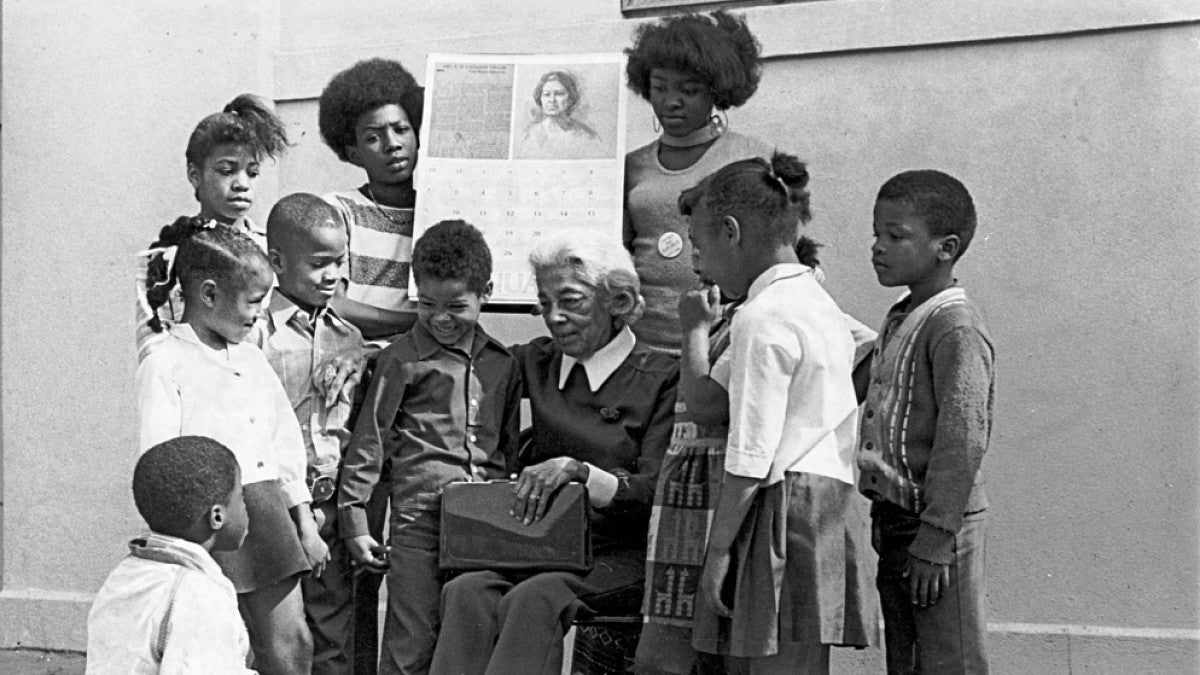Thanks to an anonymous UO Libraries donor, the legacy of African-American journalism in Oregon — and knowledge of an important civil rights pioneer — is becoming more accessible than ever.
The generous gift is funding digitization of six new titles that will diversify the perspectives represented in the library’s Historic Oregon Newspapers online resource. Debuting in February 2019, The Advocate is the first of the papers to come online, with issues dating from October 1924 to December 1933 now available.
Beginning in 1903 and continuing for three decades, the Portland-based weekly was the region’s largest African-American newspaper and at times the only black-owned paper published in the state.
For most of its storied run, The Advocate was guided by the editorial hand of Beatrice Morrow Cannady, Oregon’s most prominent civil rights activist of the early 20th century. In the pages of The Advocate, Cannady confronted the racial discrimination then routinely practiced in the businesses, schools and public squares of the Pacific Northwest.

“From the beginning, the Oregon Digital Newspaper Program has always strived to include diverse and inclusive voices in Oregon newspaper publishing, and this is continuing that tradition,” said Sarah Seymore, the digital collections metadata librarian with UO Libraries, who manages the program.
Among the first titles digitized by the program was The New Age, an earlier African-American paper from Portland. More contemporary papers The Skanner and The Portland Observer were subsequently added.
“There was a desire to provide access to more black-owned Oregon newspapers, and The Advocate was an excellent candidate,” said Katy Lenn, head of research and instructional services with UO Libraries. “The paper will provide a view of the African-American experience in Portland with the additional connection to Beatrice Morrow Cannady.”
Born in 1889 in Texas, Cannady was educated at Wiley College and the University of Chicago before moving to Portland in 1912 to marry E.D. Cannady, the founder of The Advocate. Named associate editor and manager, she quickly took responsibility for guiding the paper’s day-to-day operations and writing much of its news and editorial content.
On the occasion of The Advocate’s 22nd birthday in 1925, E.D. Cannady awarded “the lion’s share of the credit” to Beatrice Cannady for “her intrepid courage, faith in the loyalty of the people she serves and her self-confidence.”
Such personal qualities would prove indispensible in a job that required not only journalistic skill but also moxy and bravery.
In Cannady’s era, there were only about 2,500 African-Americans living in Oregon, and the Ku Klux Klan had an active and outspoken presence in the state. For many years, Cannady led local protests against screenings of “The Birth of a Nation,” an overtly racist but commercially successful 1915 silent film that portrayed the Klan in a heroic light. She spoke out against racism worldwide and called out the racial discrimination then commonplace in Portland restaurants, hotels and theaters.

An advocate for education, Cannady organized successful campaigns to end the exclusion of black children from some Washington and Oregon public schools. She also advised African-American women and mothers, in particular, to build up libraries of black literature, music and history in their homes.
Her granddaughter, Cynthia Cannady, remembered Beatrice as a woman of many talents and a strong political conscience that embraced not only the African-American community but also universal human rights.
“She was a tireless civil rights leader at a time when the Klan was active in Oregon and exclusion laws prohibited African-Americans from even residing in the state," Cynthia Cannady said. "She was a feminist at a time when women's suffrage was new and sexism was the norm. She was a believer in the equality of cultures and religions at a time when cultural arrogance and religious zealotry were common.
“She became the Pacific Northwest regional field director of the NAACP and a nationally recognized speaker. A thinker and a visionary, she espoused Pan-Africanism, learned Esperanto, curated a library of works of African-American authors, followed Bah'ai teachings and innovated with ‘interracial teas’ in her home to foster collaboration among Asian, Latino, black and white workers in Oregon. A musician, she promoted concerts of classical and spiritual music as a further avenue to promote interracial understanding.”
In 1929, her efforts were recognized nationally with a nomination for the Harmon Award in Race Relations, and in 1932 Cannady became the first African-American to run for a seat in the Oregon Legislature.

"My 2005 dissertation was about Cannady and The Advocate, and to tell their story I painstakingly reviewed some 500 issues of the weekly newspaper on microfilm at Knight Library," said Kimberley Mangun, author of "A Force for Change: Beatrice Morrow Cannady and the Struggle for Civil Rights in Oregon, 1912-1936." Mangun, who earned her doctorate in the School of Journalism and Communication, is now a faculty member at the University of Utah.
“Digitization of The Advocate will give students, other scholars, and people around the world an opportunity to read firsthand about civil rights in Portland and the state of Oregon during the first decades of the 20th century. Cannady documented a history of race and racism that was largely overlooked in Portland's white dailies.”
The librarians said digital resources like Historic Oregon Newspapers are critical for increasing access and knowledge of historical materials like The Advocate, which can often prove challenging for researchers to access in their original formats. Original microfilm of The Advocate is held by only four libraries in the U.S., and just one is outside Oregon.
“We're providing rich research resources that are accessible beyond the walls of the library,” Lenn said.
Mangun, a communication historian who studies the Black Press, noted that digitization of newspapers such as The Advocate also enables readers to conduct specific keyword searches for people, organizations, events and issues.
"Technology creates new opportunities for research and inquiry, and makes possible the preservation of fragile items like The Advocate," Mangun said.
The other funded titles — including another mid-century African-American paper, The Portland Inquirer, 1911-12 issues of labor advocacy paper The Times and the full run of Just Out, a Portland-based LGBTQ+ weekly that came to prominence in the 1980s — will be added to Historic Oregon Newspapers as digitization is completed in coming months. Established in 2011, the site already hosts more than a million pages of historic newspaper content from throughout Oregon.
“Beatrice Morrow Cannady is an inspiration to me and my family,” Cynthia Cannady said. “We hope that free digital publication of The Advocate will make her legacy more available to the public.”
—By Jason Stone, University Communications


